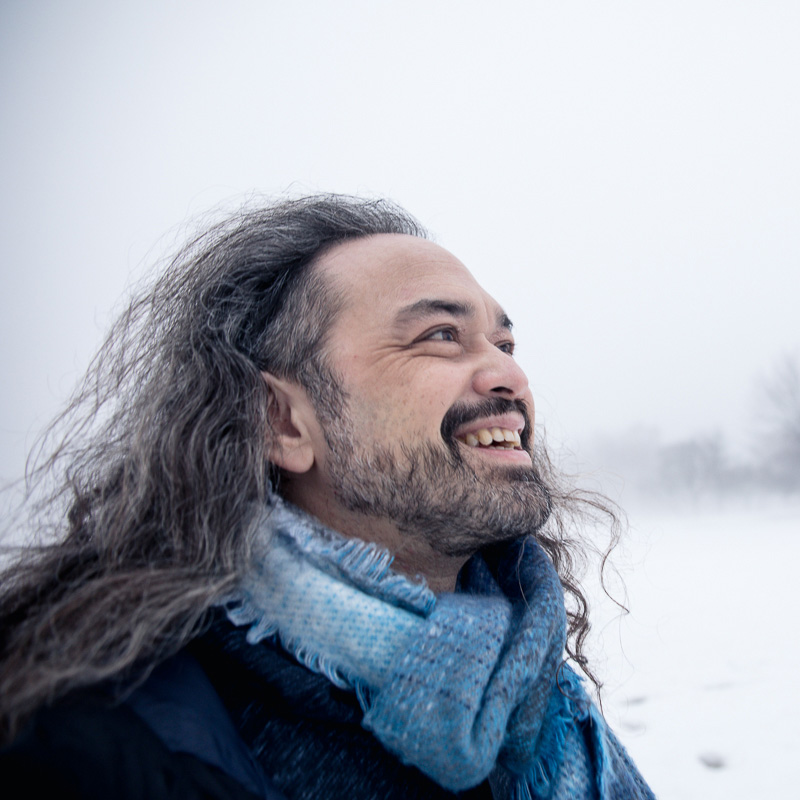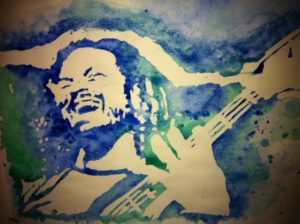Erik Santos is a composer, multi-instrumentalist, singer, producer, and teacher, who is active in many musical genres, from rock and jazz, to classical, electronic, world music, and music for theatre and dance.
What does it mean to you to be an artist in these times?
It means everything! (though I suppose it always has) I feel anxiety and depression in this strange isolation, and in the political nastiness of 2020, and in all the question marks that lie ahead for us; but it seems to me, the best thing anyone can do now is to find their resonant center—the intersection of all that they love, the things they would sit and do anyway, with or without technology or time-constraint—and attend that. If music is your life calling, and if you don’t keep practicing it, you can start to feel sick (I do). So, in this quarantine time, I ask myself, “Well, do you want to sit and rot, or do you want to pour yourself into your work and evolve?” I’ve been practicing and writing a ton, listening to new music and ideas, developing new techniques and challenging “impossibles.” With the distancing requirements, I guess I’m more focused on solo work now, though I’m nevertheless writing some new large ensemble pieces. I’m also taking time to sort through the last three decades of constant creative work, to get more of it posted online. I suppose that, ironically, due to the social restrictions, I’m starting to be more interactive with people than I normally am (I admit I’m often on the solitary side).
That’s my personal mission, but if you’re asking me, “What does it mean to be an artist in these times to society-at-large?” I can’t speak for anyone else’s opinions on this. I do, however, think it’s always taken some guts to be original, to go and know your own way, against the crowd, against one’s own self-programming and inner critic, toward a dream, upstream, and I’ve always rooted for that individual. I teach composition, and that’s about creating something from nothing. Saying something new, thinking something new, knowing something new. How does one do that? One must find out for oneself, step by step, through all kinds of uncertainty and foolishness, and then that is what the quest is worth. I don’t think this has changed—it’s still a glorious and risky mission! One never stops learning and unlearning.
What inspires you as a performer, collaborator, and teacher?
The feeling of being lifted up and beyond yourself when independent streams suddenly unify. The thrill of finding new surprises in the moment, and the giddiness everyone feels when you suddenly realize you’re sharing this fresh surprise together, especially after a long search. Conversations reveal hidden resonances, ignorances, and create new words, and, if I’ve been in a negative mood, creative conversation immediately flips my switch towards the positive. Time and again, everybody’s got to realize for themselves that they’re ignorant on some level, so that they don’t get stuck in their own delusions – intelligent conversation has always been the greatest key to unlock that. Listening and speaking intelligently with each other (and oneself) is essential for survival.
What is special about Michigan?
Funny, as many times as I’ve asked and answered that question, it’s still impossible to answer in a sentence. Well, this place has had such a long history of great artists and thinkers, both teachers and students, with stylistic boldness and flair, and patient dedication to doing things thoroughly and excellently. The University of Michigan, in particular, has always been known for its collaborative energy, worldly flavors, and musical charisma. I’ve experienced “the UM vibe” many times, as student, faculty, and staff, and so I contribute what I can to keep the great fire of our fascinations burning, to open new possibilities, and be one of the “mavericks” for which this school is known. And, in this spirit, I know I’m not alone. The University of Michigan is quite an inspiring place.
Erik Santos’ The Seer, performed by the University of Michigan Symphony Band under the direction of Professor Michael Haithcock featuring Professor Scott Piper. (2019)
How have you adapted your artistic practice during the pandemic?
I’ve given more attention to expanding my Internet presence. And, I’m still practicing like crazy, though I’m more focused in my approach nowadays, so I’ve been learning better, exponentially, and it’s been a fertile few months. I feel in great shape, and I can’t wait to be able to jam with others again. But, until social distancing requirements are reduced, I’m giving more attention to solo playing.
How are you incorporating social justice issues into your work?
Each person brings with them their own assortment of agendas, which naturally flavors their stylistic choices, in fulfilling or rebelling ways. As variety is very exciting to me, I invite all kinds of sounds into the room, though it’s to be expected that those elemental sounds are all subject to the craft, and are all going to be fed to the creative fire, with who-knows-what remaining at the end of the process. Everyone has dreams, but try to write them down, try to tell someone about them in daily language, and you soon realize that your language falls short.
In composition class, everybody creates new language all the time, making and breaking their own rules while following their fascination wherever it leads, and we all learn this new language by listening and sharing responses. Please let’s remember that, essentially, music is an arrangement of special sounds, and sound is essentially a disturbance of stasis (both pleasing and unpleasing). Creativity is inherently a willful act, and there’s actually a joy in crossing the line to find something out-of-the-ordinary. That’s a story we all enjoy hearing and telling about. When someone does something wildly original and well-crafted, the inspiration is palpable and disturbing and reorienting. It’s disarming in the most wonderful way, like laughter and awe, and in that vulnerable speechless moment, we must rely on basic politeness and reciprocity to get through the awkward first meeting.
Therefore, I teach all my students the common Japanese phrase of meeting “Yoroshiku onegaishimasu” (i.e., please take care of me, and of our relationship), and we listen to each other, contemplate the intangibles, and help each other to learn and unlearn the things we need, in order to communicate more effectively. We all do our best to be transparent, though of course, in the composition world, mystery is also a necessary element.
How are you approaching teaching this fall? Adaptations? Unexpected opportunities?
I will be on a sabbatical leave for Fall 20. But, I know that composition department activities will be fully remote for the semester. Luckily, we can meet for private lessons and seminars, and share audio files and manuscripts fairly well online. In the case of my composition classes, one misses the resonant energy of the live onsite meeting; but, on the other hand, each person in the class must write a review for each person who submitted a project, so there are still deep, diverse, and detailed critiques possible through the online format. It’s effective in its own way. There is much valuable information shared between the readers and the writers, and a slower more thorough engagement in the class creativity.
I’ve also created more opportunities to collaborate amongst classmates—technical limitations are always the mother of invention, so perhaps the online communication hazards may serve as a clarion call to the creative? Who knows, if crisis is opportunity, maybe we’re on the verge of a renaissance! All that being said, I still don’t feel that the online educational system is as powerful as the direct physical engagement with one’s musical community. There’s just no substitute for the in-person meeting, in the same room, all senses activated; but alas, for the time being, it’s the road we’re on.
Your artistic journey?
So much is changing in the world, and pretending that I know where my journey is leading is not true—it’s frustrating, though there’s also a joy in admitting to myself that I don’t know! After all, that’s the ultimate motivation for the journey, the quest. I’m finally arriving at a place where my fingers follow my ears spontaneously, and my ears and mind follow more freely what they love, and this love travels a thousand roads. To be able to make music with so many great people in this world has been my great privilege. If my artistic skills might thus serve to engender new ideas and energize future collaborations, then that would be the worth of my journey.
For a composer, improviser, and compulsive practicer, the quarantine hasn’t stopped my ability to improve my skills, though none of the new skills have had much “play” yet with other people. So, when we are able to get together to rehearse and perform again, I’m hungry to do much more jamming with people, and learn how to implement all the new stuff! Can you imagine how many creative folks are feeling the same? We’re all like caterpillars in cocoons, becoming butterflies, ready to fly.
Anything else you would like to share?
To be honest, my devotion to music has always arisen from the unexplainable way it dissolves “me” into the cosmos, the way it gets my blood pumping, and my mind focused. As the “universal language,” music has helped me unify with people of many different cultures and personalities. To channel music, one must listen to the sounds one makes. To compose music, you listen through an idea, repeatedly, pursuing the best notes for the realization of the idea, but along the way, you’re always reconsidering what you first intended, for better and worse. It can be nerve-wracking, but getting lost, getting trapped, getting free and finding your way back, is the norm in this life, so it’s important to stay open, alert, and grateful. We’re all human and fallible, but luckily that’s where the good stuff usually comes from!


